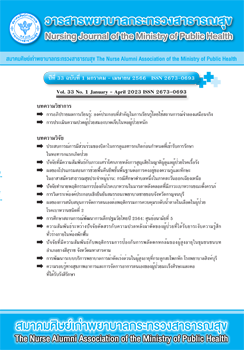Debriefing: A Crucial Component in Simulation Based Learning
Main Article Content
Abstract
Debriefing is a crucial component of simulation based learning. It is a process that takes place after learners participate in simulations. Instructors must be experts in learning situations and conduct a structured debriefing to discuss learning outcomes. This helps learners connect theory to practice by reflecting, understanding, analyzing, and synthesizing what they thought, felt, and did during the simulations. During debriefing, instructors should listen carefully to learners, provide feedback and ask meaningful debriefing questions in an atmosphere of trust and confidence. This will promote the ability of learners to apply the knowledge, skills and attitudes gained during simulations to clinical practice. Effective debriefing enables learners to achieve important outcomes, namely critical thinking skills, clinical reasoning, and clinical decision making. This article is intended to to encourage instructors who use simulation based learning to apply the principles of debriefing to achieve student learning outcomes. This article provides a definition of debriefing, a theoretical framework, debriefing methods, debriefing evaluation and development, as well as advice on debriefing from the authors’ experiences.
Article Details

This work is licensed under a Creative Commons Attribution-NonCommercial-NoDerivatives 4.0 International License.
บทความและรายงานวิจัยในวารสารพยาบาลกระทรวงสาธารณสุข เป็นความคิดเห็นของ ผู้เขียน มิใช่ของคณะผู้จัดทำ และมิใช่ความรับผิดชอบของสมาคมศิษย์เก่าพยาบาลกระทรวงสาธารณสุข ซึ่งสามารถนำไปอ้างอิงได้
References
Kim M, Kim S. Debriefing practices in simulation-based nursing education in South Korea. Clinical Simulation in Nursing.2017;13(5):201-9.
Aebersold M. Simulation-based learning: No longer a novelty in undergraduate education. OJIN: The Online Journal of Issues in Nursing.2018;23(2):1. doi:10.3912/OJIN.Vol23No02PPT39.pdf.
Beauvais AM, Phillips KE. Incorporating future of nursing competencies into a clinical and simulation assessment tool: Validating the clinical simulation competency assessment tool. Nursing Education Perspectives. 2020;41(5):280-4. doi: 10.1097/01.NEP.0000000000000709.
Kim YJ, Yoo JH. The utilization of debriefing doi: in healthcare: a literature review. Nurse Education in Practice. 2020;43102698 doi: .10.1016/j.nepr.2020.102698.
Sulaiman AL, Sabei SD, Lasater K. Simulation debriefing for clinical judgment development: a concept analysis. Nurse Education Today. 2016;45:42-7.
Pardue KT. A framework for the design, implementation, and evaluation of interprofessional education. Nurse Educator.2015;40(1):10-5. doi: 10.1097/NNE.0000000000000093.
Lee J, Lee H, Kim S, Choi M, Ko IS, Bae J, et al. Debriefing methods and learning outcomes in simulation nursing education: a systematic review and meta-analysis. Nurse Education Today.2020; 87:104345. doi: 10.1016/j.nedt.2020.104345.
Alhaj Ali A, Musallam E. Debriefing quality evaluation in nursing simulation-based education: an integrative review. Clinical Simulation in Nursing.2018;16:15-24.doi: 10.1016/j. ecns.2017.09.009.
Zhang H, Goh S, Wu X, Wang W, Mörelius E. Prelicensure nursing students’ perspectives on video-assisted debriefing following high fidelity simulation: a qualitative study. Nurse Education Today. 2019; 79:1-7.
Kolb AY, Kolb DA. Learning styles and learning spaces: Enhancing experiential learning in higher education. Academy of management learning & education. 2005;4(2):193-212.
INACSL Standards Committee, Decker S, Alinier G, Crawford SB, Gordon RM, Jenkins D, Wilson C. Healthcare simulation standards of best practice TM the debriefing process. Clinical Simulation in Nursing. 2021;58:27-32. doi: 10.1016/j.ecns.2021.08.011.
Lopreiato JO, Downing D, Gammon W, Lioce L, Sittner B, Slot V, et al. (Eds.). Healthcare Simulation Dictionary 2nded (2.1); 2020.
Mezirow J. Perspective transformation. Adult education. 1978;28(2):100-10.
Ross S. Simulation-based learning: from learning theory to pedagogical application. The Internet Journal of Allied Health Sciences and Practice. 2021 Oct 01;19(4), Article 15.
INACSL Standards Committee. INACSL standards of best practice: Simulation SM simulation design. Clinical Simulation in Nursing. 2016;12:S5-S12. doi: 10.1016/j.ecns.2016.09.008.
Niu Y, Liu T, Li K, Sun M, Sun Y, Wang X, et al. Effectiveness of simulation debriefing methods in nursing education: A systematic review and meta-analysis. Nurse Education Today.2021;107:105113. doi: 10.1016/j.nedt.2021.105113.
Dreifuerst KT. Using debriefing for meaningful learning to foster development of clinical reasoning in simulation. Journal of Nursing Education. 2012;51(6):326-33.
Phrampus PE, O’donnell JM. Debriefing using a structured and supported approach. In Levine AI, DeMaria JrS, Schwartz AD, Sim AJ editors. The comprehensive textbook of healthcare simulation. New York, NY: Springer;2013.
Chong MC. Is reflective practice a useful task for student nurses? Asian Nursing Research.2009;3(3):111-20.
Loomis A, Dreifuerst KT, Bradley CS. Acquiring, applying and retaining knowledge through debriefing for meaningful learning. Clinical Simulation in Nursing.2022;68:28-33.
Yang S-Y, Oh Y-H. Effectiveness of Debriefing for Meaningful Learning-based simulation training on high-risk neonatal care: A randomized controlled simulation study. Clinical Simulation in Nursing. 2021; 61:42-53.
Xie YD, Li XY, Liu Q, Huang R, Li T, Fang YX, et al. Cross-cultural validation and psychometric testing of the Debriefing Experience Scale (DES): a cross-sectional study. BMC medical education. 2022;22(1):1-9.
Simon R, Raemer D, Rudolph J. Debriefing assessment for simulation in healthcare (DASH). In Rater’s handbook. Boston, MA: The Center for Medical Simulation; 2010.
Reed SJ. Debriefing experience scale: development of a tool to evaluate the student learning experience in debriefing. Clinical Simulation in Nursing.2012;8(6):e211-e7.
Hall K, Tori K. Best practice recommendations for debriefing in simulation-based education for Australian undergraduate nursing students: an integrative review. Clinical Simulation in Nursing. 2017;13(1):39-50.

